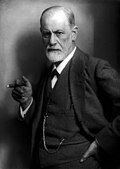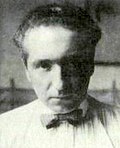Portal:Psychology/Selected psychologist
| This Wikipedia page has been superseded by Portal:Psychology and is retained primarily for historical reference. |
| Note: Article entries are now being transcluded directly on the main portal page. However, this page should be retained for historical reference. |
Usage
The layout design for these subpages is at Portal talk:Psychology/Selected psychologist.
- Add a new selected biography (NOT necessarily a psychologist, despite the page name) to the next available subpage.
- Update "max=" to new total for its {{Random portal component}} on the main page.
Selected psychologist 1
Portal:Psychology/Selected psychologist/1

Selected psychologist 2
Portal:Psychology/Selected psychologist/2

Selected psychologist 3
Portal:Psychology/Selected psychologist/3 Solomon Eliot Asch (September 14, 1907 – February 20, 1996) was an American Gestalt psychologist and pioneer in social psychology. He created seminal pieces of work in impression formation, prestige suggestion, conformity, and many other topics in social psychology. His work follows a common theme of Gestalt psychology that the whole is not only greater than the sum of its parts, but the nature of the whole fundamentally alters the parts. Asch stated: "Most social acts have to be understood in their setting, and lose meaning if isolated. No error in thinking about social facts is more serious than the failure to see their place and function" (Asch, 1952, p. 61). He is most well known for his conformity experiments, in which he demonstrated the influence of group pressure on opinions. (Full article...)
Selected psychologist 4
Portal:Psychology/Selected psychologist/4

Freud qualified as a doctor of medicine at the University of Vienna in 1881, and then carried out research into cerebral palsy, aphasia and microscopic neuroanatomy at the Vienna General Hospital. He was appointed a university lecturer in neuropathology in 1885 and became an affiliated professor (professor extraordinarius) in 1902.
In creating psychoanalysis, a clinical method for treating psychopathology through dialogue between a patient and a psychoanalyst, Freud developed therapeutic techniques such as the use of free association and discovered transference, establishing its central role in the analytic process. Freud’s redefinition of sexuality to include its infantile forms led him to formulate the Oedipus complex as the central tenet of psychoanalytical theory. His analysis of dreams as wish-fulfillments provided him with models for the clinical analysis of symptom formation and the mechanisms of repression as well as for elaboration of his theory of the unconscious as an agency disruptive of conscious states of mind. Freud postulated the existence of libido, an energy with which mental processes and structures are invested and which generates erotic attachments, and a death drive, the source of repetition, hate, aggression and neurotic guilt. In his later work Freud developed a wide-ranging interpretation and critique of religion and culture.
Psychoanalysis remains influential within psychotherapy, within some areas of psychiatry, and across the humanities. As such, it continues to generate extensive and highly contested debate with regard to its therapeutic efficacy, its scientific status, and whether it advances or is detrimental to the feminist cause. (Full article...)
Selected psychologist 5
Portal:Psychology/Selected psychologist/5

The central concept of analytical psychology is individuation—the psychological process of integrating the opposites, including the conscious with the unconscious, while still maintaining their relative autonomy. Jung considered individuation to be the central process of human development.
Jung created some of the best known psychological concepts, including the archetype, the collective unconscious, the complex, and synchronicity. The Myers-Briggs Type Indicator (MBTI), a popular psychometric instrument, was developed from Jung's theory of psychological types.
Jung saw the human psyche as "by nature religious" and made this religiousness the focus of his explorations. Jung is one of the best known contemporary contributors to dream analysis and symbolization.
Though he was a practising clinician and considered himself to be a scientist, much of his life's work was spent exploring tangential areas such as Eastern and Western philosophy, alchemy, astrology, and sociology, as well as literature and the arts. Jung's interest in philosophy and the occult led many to view him as a mystic, although his ambition was to be seen as a man of science. His influence on popular psychology, the "psychologization of religion", spirituality and the New Age movement has been immense. (Full article...)
Selected psychologist 6
Portal:Psychology/Selected psychologist/6

Skinner invented the operant conditioning chamber, also known as the Skinner Box. He was a firm believer of the idea that human free will was actually an illusion and any human action was the result of the consequences of that same action. If the consequences were bad, there was a high chance that the action would not be repeated; however if the consequences were good, the actions that led to it would be reinforced. He called this the principle of reinforcement.
He innovated his own philosophy of science called radical behaviorism, and founded his own school of experimental research psychology—the experimental analysis of behavior, coining the term operant conditioning. His analysis of human behavior culminated in his work Verbal Behavior, as well as his philosophical manifesto Walden Two. Contemporary academia considers Skinner a pioneer of modern behaviorism along with John B. Watson and Ivan Pavlov. (Full article...)
Selected psychologist 7
Portal:Psychology/Selected psychologist/7

Piaget placed great importance on the education of children. As the Director of the International Bureau of Education, he declared in 1934 that "only education is capable of saving our societies from possible collapse, whether violent, or gradual."
Piaget created the International Center for Genetic Epistemology in Geneva in 1955 and directed it until his death in 1980. The number of collaborations that its founding made possible, and their impact, ultimately led to the Center being referred to in the scholarly literature as "Piaget's factory."
According to Ernst von Glasersfeld, Jean Piaget was "the great pioneer of the constructivist theory of knowing." However, his ideas did not become widely popularized until the 1960s. This then led to the emergence of the study of development as a major sub-discipline in psychology. (Full article...)
Selected psychologist 8
Portal:Psychology/Selected psychologist/8 Erving Goffman (11 June 1922 – 20 November 1982), a Canadian-born sociologist and writer, was considered "the most influential American sociologist of the twentieth century". In 2007 he was listed by The Times Higher Education Guide as the sixth most-cited author in the humanities and social sciences, behind Anthony Giddens and ahead of Jürgen Habermas.
Goffman was the 73rd president of the American Sociological Association. His best-known contribution to social theory is his study of symbolic interaction. This took the form of dramaturgical analysis, beginning with his 1959 book, The Presentation of Self in Everyday Life. Goffman's other major works include Asylums (1961), Stigma (1963), Interaction Ritual (1967), Frame Analysis (1974), and Forms of Talk (1981). His major areas of study included the sociology of everyday life, social interaction, the social construction of self, social organization (framing) of experience, and particular elements of social life such as total institutions and stigmas. (Full article...)
Selected psychologist 9
Portal:Psychology/Selected psychologist/9 George Armitage Miller (February 3, 1920 – July 22, 2012) was one of the founders of the cognitive psychology field. He also contributed to the birth of psycholinguistics and cognitive science in general. Miller wrote several books and directed the development of WordNet, an online word-linkage database usable by computer programs. He authored the paper, "The Magical Number Seven, Plus or Minus Two," which experimentally discovered an average limit of seven for human short-term memory capacity. This paper is frequently cited in both psychology and the wider culture. He also won awards such as the National Medal of Science.
Miller started his education focusing on speech and language and published papers on these topics, focusing on mathematical, computational and psychological aspects of the field. He started his career at a time when the reigning theory in psychology was behaviorism, which eschewed any attempt to study mental processes and focused only on observable behavior. Working mostly at Harvard University, MIT and Princeton University, Miller introduced experimental techniques to study the psychology of mental processes, by linking the new field of cognitive psychology to the broader area of cognitive science, including computation theory and linguistics. He collaborated and co-authored work with other figures in cognitive science and psycholinguistics, such as Noam Chomsky. For moving psychology into the realm of mental processes and for aligning that move with information theory, computation theory, and linguistics, Miller is considered one of the great twentieth-century psychologists. (Full article...)
Selected psychologist 10
Portal:Psychology/Selected psychologist/10

Pinker's academic specializations are visual cognition and psycholinguistics. His experimental subjects include mental imagery, shape recognition, visual attention, children's language development, regular and irregular phenomena in language, the neural bases of words and grammar, and the psychology of innuendo and euphemism. He published two technical books which proposed a general theory of language acquisition and applied it to children's learning of verbs. In particular, his work with Alan Prince published in 1989 critiqued the connectionist model of how children acquire the past tense of English verbs, arguing instead that children use default rules such as adding "-ed" to make regular forms, sometimes in error, but are obliged to learn irregular forms one by one. (Full article...)
Selected psychologist 11
Portal:Psychology/Selected psychologist/11

Selected psychologist 12
Portal:Psychology/Selected psychologist/12

Selected psychologist 13
Portal:Psychology/Selected psychologist/13 Albert Ellis (September 27, 1913 – July 24, 2007) was an American psychologist who in 1955 developed Rational Emotive Behavior Therapy (REBT). He held M.A. and Ph.D. degrees in clinical psychology from Columbia University and American Board of Professional Psychology (ABPP). He also founded and was the President of the New York City-based Albert Ellis Institute for decades. He is generally considered to be one of the originators of the cognitive revolutionary paradigm shift in psychotherapy and the founder of cognitive-behavioral therapies. Based on a 1982 professional survey of USA and Canadian psychologists, he was considered as the second most influential psychotherapist in history (Carl Rogers ranked first in the survey; Sigmund Freud was ranked third). (Full article...)
Selected psychologist 14
Portal:Psychology/Selected psychologist/14 Carl Ransom Rogers (January 8, 1902 – February 4, 1987) was an influential American psychologist and among the founders of the humanistic approach (or client-centered approach) to psychology. Rogers is widely considered to be one of the founding fathers of psychotherapy research and was honored for his pioneering research with the Award for Distinguished Scientific Contributions by the American Psychological Association (APA) in 1956.
The person-centered approach, his own unique approach to understanding personality and human relationships, found wide application in various domains such as psychotherapy and counseling (client-centered therapy), education (student-centered learning), organizations, and other group settings. For his professional work he was bestowed the Award for Distinguished Professional Contributions to Psychology by the APA in 1972. In a study by Haggbloom et al. (2002) using six criteria such as citations and recognition, Rogers was found to be the sixth most eminent psychologist of the 20th century and second, among clinicians, only to Sigmund Freud. (Full article...)
Selected psychologist 15
Portal:Psychology/Selected psychologist/15

Known for his advocacy of democracy, Dewey considered two fundamental elements—schools and civil society—to be major topics needing attention and reconstruction to encourage experimental intelligence and plurality. (Full article...)
Selected psychologist 16
Portal:Psychology/Selected psychologist/16

Selected psychologist 17
Portal:Psychology/Selected psychologist/17 [[File:|right|120px]] NAME AT TOP OF ARTICLE (IF DIFFERENT FROM ARTICLE NAME) (Full article...)
Selected psychologist 18
Portal:Psychology/Selected psychologist/18 [[File:|right|120px]] NAME AT TOP OF ARTICLE (IF DIFFERENT FROM ARTICLE NAME) (Full article...)
Selected psychologist 19
Portal:Psychology/Selected psychologist/19 [[File:|right|120px]] NAME AT TOP OF ARTICLE (IF DIFFERENT FROM ARTICLE NAME) (Full article...)
Selected psychologist 20
Portal:Psychology/Selected psychologist/20 [[File:|right|120px]] NAME AT TOP OF ARTICLE (IF DIFFERENT FROM ARTICLE NAME) (Full article...)
Selected psychologist 21
Portal:Psychology/Selected psychologist/21 [[File:|right|120px]] NAME AT TOP OF ARTICLE (IF DIFFERENT FROM ARTICLE NAME) (Full article...)
Selected psychologist 22
Portal:Psychology/Selected psychologist/22 [[File:|right|120px]] NAME AT TOP OF ARTICLE (IF DIFFERENT FROM ARTICLE NAME) (Full article...)
Additions
Feel free to add Most important authors in psychology or top or high importance psychologists to the above list.
